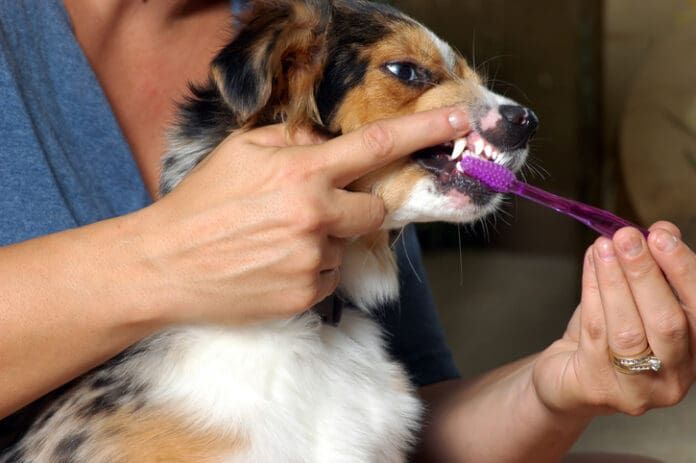Excerpted from Keeping Your Dog’s Teeth and Gums Healthy by Dr. Randy Kidd, Lisa Rodier, CNWI, Nancy Kerns, and Lorie Long
We often consider dental disease — the buildup of plaque and calculus on the teeth and inflammation of the gums (gingivitis) – as the main cause of bad breath in a dog. While the seriousness of dental disease shouldn’t be minimized, there are lots of other reasons why your dog’s mouth might smell off. Other causes of unpleasant odors include:
- The tongue;
- Metabolic disease, such as diabetes and renal disease;
- GI issues from excessive licking or swallowing, creating excess gas in the GI tract;
- GI upset caused by megaesophagus, food allergy, bacterial overgrowth, neoplasia (cancer of the mouth or intestines), or a foreign body (bones, rocks, toys, socks);
- Dietary (fish-based diets, oral fatty acids, coprophagia, the consumption of other fetid foodstuffs);
- Maldigestion;
- Respiratory disease (rhinitis, sinusitis, neoplasia);
- Autoimmune disease;
- Non-periodontal oral disease (orthodontic, pharyngitis, tonsillitis, neoplasia);
- Oral cancer;
- Trauma (oral foreign bodies, damaged palate from stick chewing, electric cord injury, caustic agents).
Understanding the origin of the smell is your first assignment and may require the expertise of your veterinarian, or veterinary specialist, to pinpoint. T-cell lymphoma, for example, is a rare but deadly disease that can present on the face. It mimics many other conditions and can be difficult to diagnose without a specialist’s intervention.
For more information on foul mouth odors, purchase Whole Dog Journal’s ebook Keeping Your Dog’s Teeth and Gums Healthy.






